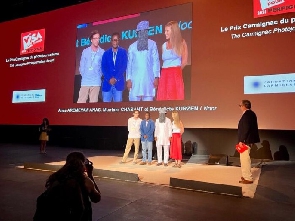Ace investigative reporter Anas Aremeyaw Anas and photojournalists Muntaka Chasant and Bénédicte Kurzen have won and received the 13th edition of the Carmignac Journalism Award in France.
The prize is dedicated to Ghana and the ecological and human challenges associated with the transboundary flow of electronic waste. They spent nearly a year documenting the ambiguous and complex ecosystem of e-waste, which is both a crucial economic opportunity for thousands of people in Ghana and has a considerable human and environmental impact.
Together, combining a national and international approach, the team studied the ramifications of e-waste trafficking between Europe and Ghana, revealing the opacity of this globalised cycle.
The prize was awarded to a team made up of investigative and anti-corruption journalist and activist Anas Aremeyaw Anas and photojournalists Muntaka Chasant and Bénédicte Kurzen (NOOR).
“Moving away from the stereotype portrayal of Ghana as the dustbin of the world, they would spend months documenting the complex e-waste ecosystem. Combining a national and international approach, the trio would study the ramifications of e-waste trafficking between Europe and Ghana, revealing the opacity of this globalised circuit,”Carmignac Foundation, the organisers of the award said.
Announcing the awards at a heavily packed Visa pour l’Image international photojournalism festival in Perpignan, Southern France, Anas Aremeyaw Anas said it was an honour for him to win the award, adding that it would provide him and his team the opportunity to dive deeper into the ecosystem of e-waste in Africa.
Muntaka Chasant indicated that the issue would not only show the human and environmental costs of informal e-waste practices but also how the secondary raw materials they extract “contain critical minerals that are key to the green transition of Ghana.”
Kurzen also expressed happiness in winning the award.
Video
General News of Friday, 22 December 2023
Source: dailymailgh.com

















